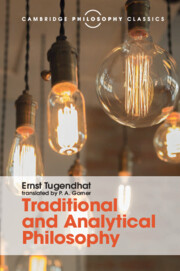Book contents
- Frontmatter
- Dedication
- Contents
- Preface
- Preface
- Translator's preface
- Part I Introduction: confrontation of analytical philosophy with traditional conceptions of philosophy
- 1 A question of method
- 2 A philosopher in search of a conception of philosophy
- 3 Ontology and semantics
- 4 Has formal semantics a fundamental question?
- 5 Consciousness and speech
- 6 The argument with the philosophy of consciousness continued
- 7 A practical conception of philosophy
- Part II A first step: analysis of the predicative sentence
- Bibliography
- Index of names
- Index of subjects
2 - A philosopher in search of a conception of philosophy
from Part I - Introduction: confrontation of analytical philosophy with traditional conceptions of philosophy
Published online by Cambridge University Press: 05 August 2016
- Frontmatter
- Dedication
- Contents
- Preface
- Preface
- Translator's preface
- Part I Introduction: confrontation of analytical philosophy with traditional conceptions of philosophy
- 1 A question of method
- 2 A philosopher in search of a conception of philosophy
- 3 Ontology and semantics
- 4 Has formal semantics a fundamental question?
- 5 Consciousness and speech
- 6 The argument with the philosophy of consciousness continued
- 7 A practical conception of philosophy
- Part II A first step: analysis of the predicative sentence
- Bibliography
- Index of names
- Index of subjects
Summary
The confrontation with earlier conceptions of philosophy with which I am beginning the introduction to language-analytical philosophy not only has the aim of justifying this way of doing philosophy; it is also intended as a way of finding its own central question. The first thrust remained on the periphery. We merely inferred what language-analytical philosophy is from the definition of the name. And the idea that philosophy is a priori was simply taken over from the tradition. Nonetheless we did succeed in taking a first step towards justification: the apparently superficial idea that the method of philosophy consists in an analysis of our linguistic understanding was shown to be the defensible core of the traditional conception of the a priori character of philosophy. With this first step we have reached the current self-understanding of language-analytical philosophers. However, this self-understanding is not adequate, for, as we have seen, it provides no criterion for distinguishing the philosophically relevant words, or what is philosophically relevant in language, from what is philosophically irrelevant. For this we clearly need a definition of the subject-matter of philosophy, something which is not given simply by saying that the subject-matter of philosophy is a priori.
How should one proceed? One could try to make distinctions within the sphere of the a priori, to distinguish different species of the analytic. One could, for example, exclude empirical expressions which can be defined in terms of a combination of properties. For example, the sentence ‘Bachelors are unmarried’ is analytic because ‘bachelor’ is defined as ‘unmarried man’. One could try to delimit a class of expressions which one feels are not empirical in this sense and which may be thought to be somehow (I am deliberately expressing myself in this vague way) philosophically relevant: words such as ‘good’, ‘true’, ‘action’, ‘belief’, ‘experience’, ‘time’, ‘object’, ‘meaning’.
I shall not take this path, though it seems to me promising and has yet to be developed. Even if by following this path one succeeded in arriving at useful distinctions one would still lack orientation with respect to the question of which linguistic sphere is philosophically relevant. For to be able to decide this one must start from a conception of the subject-matter of philosophy.
- Type
- Chapter
- Information
- Traditional and Analytical PhilosophyLectures on the Philosophy of Language, pp. 12 - 20Publisher: Cambridge University PressPrint publication year: 2016

